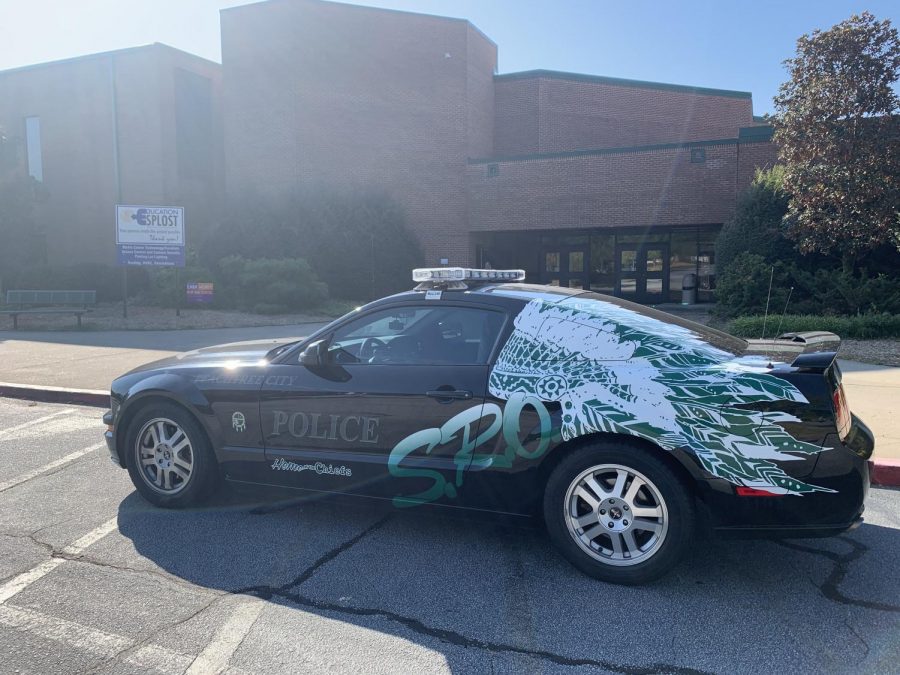Police Line, Do Not Cross
Looking for the Line Between a Joke and a Threat
On Sept. 25, several McIntosh students overheard a peer making possible threats. After this was communicated to the school resource officer, a police investigation began. The police interviewed witnesses, searched the juvenile’s residence, and charged him with making terroristic threats and possession of THC oil.
As news of the arrest circulated through McIntosh, so did phrases like “just a joke” and “overreacting.” Unfortunately, the event is not specific to McIntosh. In August, a 15-year-old boy was arrested in Florida after making a mass shooting threat online, and a 15-year-old girl was arrested in California for posting a threat on Snapchat. In September, a 14-year-old in Mississippi was charged with making a terroristic threat on social media. On Oct. 3, a Nashville teen was arrested for false emergency report of a school shooting. Across the nation, law enforcement officials are taking these threats seriously. In a time when the media is overwhelmed with stories of violence in schools, “just a joke” is no longer a valid excuse. In 2019, how can McIntosh students keep from crossing the line between a joke and a threat?
According to School Resource Officer Chris Judy, much of the validity of a threat lies in past behavior.
“You know, we had one last year, too,” said Judy. “That was just said kind of in passing, kind of in context to something they were talking about. This was kind of out of the blue and not in context, so [it] was an unprovoked statement that was overheard by other students.”
However, even without a precedent, a threat is almost never regarded as a joke.
“I take all that seriously until I investigate otherwise,” said Judy. “We fully investigated everything all the way out, just to make sure that you guys are safe the next day. We did search warrants in the house, we did arrest warrants, we did everything we could.”
Furthermore, even when a student claims they were just joking, Judy looks at “if [they] had the means to carry it out, what led up to that event, what happens after that event. The way I see it, any little thing like that I have to take seriously, because if I don’t take it seriously and something does happen, that’s on me.”
Apparently, the line between a joke and a threat is much clearer than McIntosh students seem to think. According to Judy’s words, any statement that could be interpreted as a threat will be investigated by the school and the police.
So why does this disconnect between the students and the law enforcement exist? Time after time, from location to location, the same reasoning by students is being used to protest the same justifiable actions by police officers. Administration, resource officers, parents, and students all need to rapidly come to a mutual understanding on the topic, and it seems clear that the way to do this is not provide more leniency on the interpretation of potentially threatening jokes.
When it comes to personal safety in the modern day, there is absolutely no room for any margin of confusion or disagreement. Essentially, students around the nation must understand that simply no joke exists on the topic of school safety. In other words, to answer our previous question, it seems like the only way McIntosh students can keep themselves from crossing the line between a threat and a joke is to never even approach it.
Your donation supports the student journalists of McIntosh High School. Your contribution allows us to cover our annual website hosting costs, to help pay printing costs for "Back to Mac" magazine, and continuing education for staff, such as SNO trainings and MediaNow! editorial leadership training.

Adelaide Barrett is a junior and first year member of the Trail staff. She is thrilled to have the opportunity to improve her writing and photography skills...

Zack Stone is thrilled to be joining the Trail staff for his senior year at McIntosh! His passions for reading, writing, current events, and storytelling...

Senior Sam Cornett has been a part of the Trail staff since her freshman year. She held the Sports Editor position for both her sophomore and junior year,...


